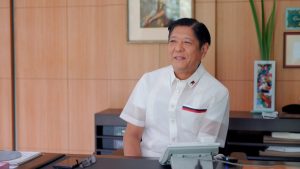Philippine President Ferdinand Marcos Jr. will depart this weekend for state visits to Indonesia and Singapore, his first overseas trip since assuming office.
Marcos, who took the oath of office on June 30 after his landslide election victory the previous month, will be in Indonesia on September 4-6 at the invitation of President Joko “Jokowi” Widodo, the Philippine Department of Foreign Affairs (DFA) said in a statement yesterday. This will be followed by a visit to Singapore on September 6-7.
“The President’s back-to-back visits to Indonesia and Singapore as his inaugural overseas trip demonstrate the importance the Philippines places on relations with fellow ASEAN neighbors,” the statement said.
In Indonesia, it added, Marcos and Jokowi are “expected to discuss the two countries’ active and multi-faceted cooperation on defense, maritime, border, economic and people-to-people cooperation.”
The two leaders will also witness the signing of several agreements in the defense and agricultural fields, as well as a supposed “comprehensive plan of action” that would guide the two nations’ bilateral priorities in the next five years.
In Singapore, Marcos will meet with Singaporean President Halimah Yacob and Prime Minister Lee Hsien Loong to “discuss the close bilateral relations between the two countries, as well as regional and global issues,” the DFA statement said. The two leaders will “also witness the signing of agreements in the areas of counter-terrorism and data privacy.”
While it is perhaps possible to read too much into the destinations that new leaders choose for their first state visits, Marcos’ choice is notable for the extent to which it hews to that of his predecessor, Rodrigo Duterte. Aside from his trip to Laos to attend an ASEAN Summit meeting, the gruff leader’s first official state visit was also to Indonesia, in early September 2016, which was followed by trips to Vietnam in late September and to Brunei in mid-October.
The most likely departure is likely to concern the great powers. While their ASEAN-first orientation has been similar, Duterte notably chose to visit China prior to the United States, the Philippines’ longtime security ally, and Japan. (During his entire six-year term, Duterte never once visited the United States.) In contrast, the staunchly pro-U.S. President Benigno Aquino III’s first three visits were to the U.S., Vietnam, and Japan.
Duterte’s trip to Beijing consummated his “pivot” away from the U.S. and toward Xi Jinping’s China. “In this venue I announce my separation from the United States,” Duterte said while greeting Chinese officials in the Great Hall of the People, proclaiming to his hosts that he had “realigned myself in your ideological flow.”
As it stands, it seems likely that Marcos will visit the U.S. before China. The new Philippine leader is reportedly keen to tend the United Nations General Assembly in New York later this month. President Joe Biden has apparently invited Marcos to visits, and presidential spokespersons have confirmed that the trip is currently being organized. (One possible hitch is the standing contempt order against Marcos for violating a Hawaii court injunction that ordered the Marcos family to pay damages to victims of the martial law regime of his father and namesake, President Ferdinand E. Marcos.)
While Marcos has made clear that he wants good relations with China, to the extent that he has flip-flopped on whether Manila will wield the 2016 arbitral ruling in the South China Sea, it is clear that his perspective on Sino-American competition is not colored with nearly as much personal animus as that of his predecessor.
Duterte’s “separation” from the U.S. was driven in large part by Duterte’s personal reaction to the Obama administration’s criticisms of his ruthlessly violent war on drugs, which were layered on top of a host of other personal and political slights dating back to his long tenure as the mayor of Davao City in the southern Philippines.

































